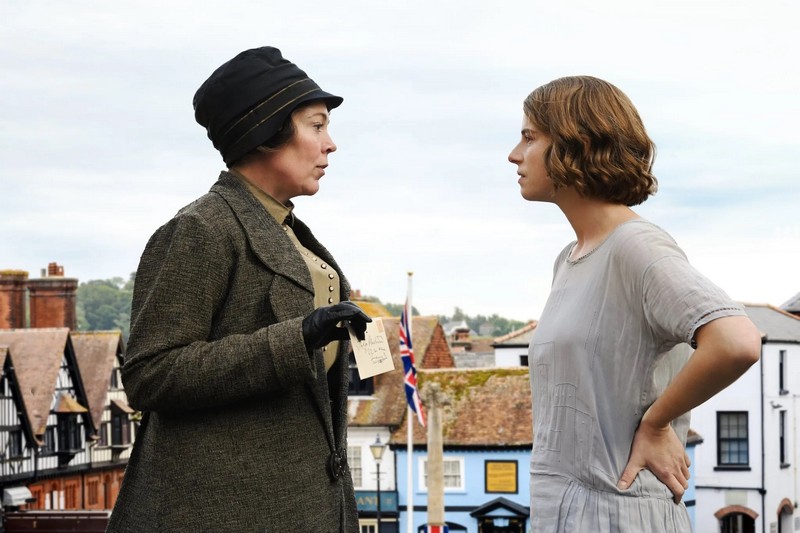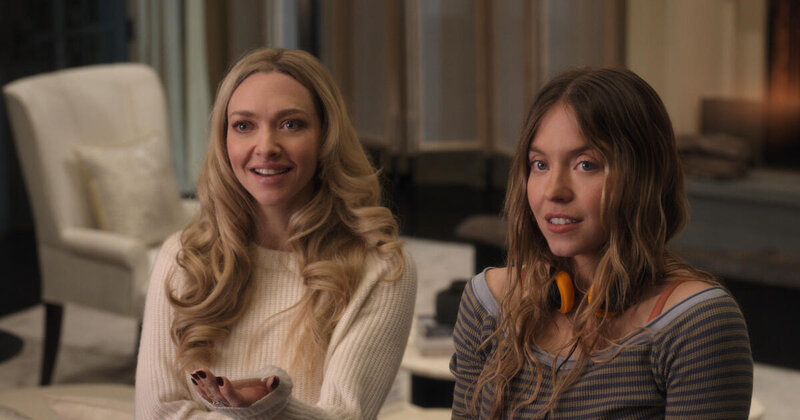If you thought abusive communications were a recent thing, think again. Humans have unfortunately been sending horrible correspondence to each other basically since writing began. In the late 19th Century, these nasty notes were given a name: poison pen letters. Now they’ve largely disappeared – thanks to the Internet – replaced by the equally nasty (if not more so) phenomenon of online trolling and flat-out abuse. But for a while there, they were headline news. Now director Thea Shorrock revisits and reshapes a mostly-forgotten incident in Wicked Little Letters.

It’s 1920 in the sleepy English seaside town of Littlehampton. Edith Swan (Olivia Colman) lives with her aging father Edward (Timothy Spall) and mother Victoria (Gemma Jones) in a modest house. Their neighbours are Irish immigrant Rose Gooding (Jessie Buckley), her husband Bill (Malachai Kirby) and daughter Nancy (Alicia Weir). For weeks, the Swans have been receiving invective-riddled letters from an anonymous source. The deeply religious Edith is convinced Rose is behind it all. The two had been friends when Rose first moved to the town, but have since fallen out over a series of petty disputes.
Despite Edith’s belief, she’s reluctant to go to the police about the matter. An added complication is there’s little if any proof Rose is the poison-pen writer. But Edward has had enough. He’s a blowhard and a bully, and soon berates the rather ineffectual Constable Papperwick (Hugh Skinner) to open an investigation. The prejudices of the time see the formal investigation wrapped up quickly and the police decide to prosecute Rose. A conviction would not only likely result in a prison sentence – Rose could also lose Nancy. But not everyone in the police is convinced. Police Officer Gladys Moss (Anjana Vasan) is rather more inclined to follow the evidence rather than Edward’s or Edith’s theories. After a couple of missteps, she becomes convinced Rose is not behind the letters. But if she isn’t, then who is?
The real-life “Littlehampton letters” case was a sensation in 1920s Britain. It wasn’t the first instance of a poison-pen prosecution (that happened in America in 1913), but it was a genuine headline-grabber in its day. If you’re familiar with the case, you’ll know how it goes. But after more than 100 years, it’s unlikely anyone will spoil the surprise. Screenwriter Jonny Sweet (Johnny English Strikes Again) has taken a lot of liberties with the facts but manages to craft an intriguing narrative with a touch of the absurd about it. His re-working introduces contemporary themes into the plot. And while those themes aren’t heavy by any means, the film still makes some thoughtful points. The story loses a bit of steam about two-thirds of the way through; but I was happy to stay with it to the end.
Sharrock (Me Before You) keeps the tale tripping lightly along. The humour is a bit restrained, but Sharrock and Sweet deliver some witty one-liners and a couple of pretty funny scenes (mostly involving salty language). But the overall mood is more restrained than raucous. The film is helped along immensely by some outstanding production design by Cristina Casali (The Death of Stalin), captured crisply by DOP Ben Davis (The Banshees of Inisherin). Isobel Waller-Bridge (yes, sister of Phoebe) provides the bright score.
Olivia Colman (Empire of Light) is, as always, wonderful as the priggish Edith, even if the role is hardly a stretch. Anjana Vasan (Cyrano) is great as the clever but buttoned-down Moss. Hugh Skinner (Falling for Figaro) has some fun with the none-too-bright Papperwick; while Timothy Spall (Spencer) draws the short straw as the nasty Edward, although he manages to find some bright spots in the character. But Jessie Buckley (Women Talking) effortlessly strolls away with the film as the straight-talking Rose.
In many ways, Wicked Little Letters is an archetypal British period comedy, but with a modern twist. It’s a gently witty look at an issue that certainly carries a lot of contemporary relevance. And while it might not set the world on fire, it’s still entertaining and well-made.
David Edwards
Other reviews you might enjoy:

David Edwards is the former editor of The Blurb and a contributor on film and television





